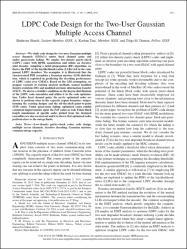| dc.contributor.author | Sharifi, Shahrouz | |
| dc.contributor.author | Tanc, A. Korhan | |
| dc.contributor.author | Duman, Tolga M. | |
| dc.date.accessioned | 2021-12-12T17:01:35Z | |
| dc.date.available | 2021-12-12T17:01:35Z | |
| dc.date.issued | 2016 | |
| dc.identifier.issn | 1536-1276 | |
| dc.identifier.issn | 1558-2248 | |
| dc.identifier.uri | https://doi.org/10.1109/TWC.2015.2511749 | |
| dc.identifier.uri | https://hdl.handle.net/20.500.11857/3234 | |
| dc.description.abstract | We study code design for two-user Gaussian multiple access channels (GMACs) under fixed channel gains and under quasi-static fading. We employ low-density parity-check (LDPC) codes with BPSK modulation and utilize an iterative joint decoder. Adopting a belief propagation (BP) algorithm, we derive the PDF of the log-likelihood-ratios (LLRs) fed to the component LDPC decoders. Via examples, it is illustrated that the characterized PDF resembles a Gaussian mixture (GM) distribution, which is exploited in predicting the decoding performance of LDPC codes over GMACs. Based on the GM assumption, we propose variants of existing analysis methods, named modified density evolution (DE) andmodified extrinsic information transfer (EXIT). We derive a stability condition on the degree distributions of the LDPC code ensembles and utilize it in the code optimization. Under fixed channel gains, the newly optimized codes are shown to perform close to the capacity region boundary outperforming the existing designs and the off-the-shelf point-to-point (P2P) codes. Under quasi-static fading, optimized codes exhibit consistent improvements upon the P2P codes as well. Finite block length simulations of specific codes picked from the designed ensembles are also carried out and it is shown that optimized codes perform close to the outage limits. | en_US |
| dc.description.sponsorship | National Science FoundationNational Science Foundation (NSF) [NSF-CCF 1117174]; European CommissionEuropean CommissionEuropean Commission Joint Research Centre [MC-CIG PCIG12-GA-2012-334213]; Turkish Scientific and Technological Research Council of Turkey (TUBITAK)Turkiye Bilimsel ve Teknolojik Arastirma Kurumu (TUBITAK) [114E601] | en_US |
| dc.description.sponsorship | This work was supported in part by the National Science Foundation under Grant NSF-CCF 1117174, in part by the European Commission under Grant MC-CIG PCIG12-GA-2012-334213, and in part by the Turkish Scientific and Technological Research Council of Turkey (TUBITAK) under Grant 114E601. The associate editor coordinating the review of this paper and approving it for publication was Z. Wang. | en_US |
| dc.language.iso | eng | en_US |
| dc.publisher | Ieee-Inst Electrical Electronics Engineers Inc | en_US |
| dc.relation.ispartof | Ieee Transactions On Wireless Communications | en_US |
| dc.identifier.doi | 10.1109/TWC.2015.2511749 | |
| dc.rights | info:eu-repo/semantics/openAccess | en_US |
| dc.subject | Low-density parity-check codes | en_US |
| dc.subject | code design | en_US |
| dc.subject | multiple access channels | en_US |
| dc.subject | iterative decoding | en_US |
| dc.subject | Gaussian mixture | en_US |
| dc.subject | common outage capacity | en_US |
| dc.title | LDPC Code Design for the Two-User Gaussian Multiple Access Channel | en_US |
| dc.type | article | |
| dc.authorid | Tanc, A. Korhan/0000-0002-0223-7285 | |
| dc.authorid | Duman, Tolga M/0000-0002-5187-8660 | |
| dc.department | Fakülteler, Mühendislik Fakültesi, Elektrik-Elektronik Mühendisliği Bölümü | |
| dc.identifier.volume | 15 | en_US |
| dc.identifier.startpage | 2833 | en_US |
| dc.identifier.issue | 4 | en_US |
| dc.identifier.endpage | 2844 | en_US |
| dc.relation.publicationcategory | Makale - Uluslararası Hakemli Dergi - Kurum Öğretim Elemanı | en_US |
| dc.authorscopusid | 56337485700 | |
| dc.authorscopusid | 6505555303 | |
| dc.authorscopusid | 7004018156 | |
| dc.identifier.wos | WOS:000374240500030 | en_US |
| dc.identifier.scopus | 2-s2.0-84963857403 | en_US |
| dc.authorwosid | Tanc, A. Korhan/ABI-3928-2020 | |
| dc.authorwosid | Duman, Tolga M/F-4113-2015 | |



















